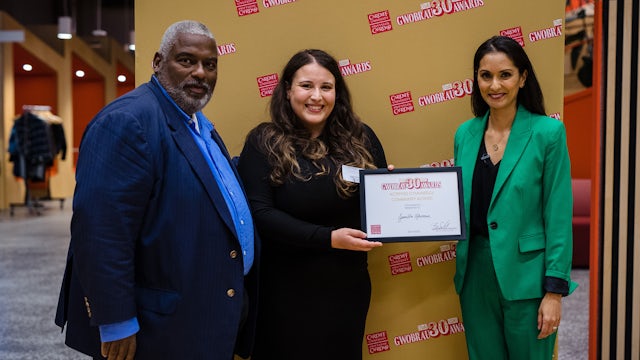
Championing positive change to mental health in the Muslim community
Jamilla Hekmoun (MA 2018) is chair of the Muslim Mental Health Alliance (MMHA), and spent the pandemic working tirelessly to provide resources and support to the Muslim community. She also sits on the board of the Muslim Council of Wales and leads community engagement for SEF Cymru. We spoke to Jamilla about her time at Cardiff University and the important work she does in the community.
Jamilla Hekmoun (MA 2018) is chair of the Muslim Mental Health Alliance (MMHA), and spent the pandemic working tirelessly to provide resources and support to the Muslim community. She also sits on the board of the Muslim Council of Wales and leads community engagement for SEF Cymru. We spoke to Jamilla about her time at Cardiff University and the important work she does in the community.
Jamilla wanted to come to Cardiff after studying a module called ‘Muslims in Britain’ during her undergraduate degree. “I found the MA at Cardiff in Islam in Contemporary Britain and it sounded perfect,” she explained. “I was also privileged to get a scholarship to enable me to study the course.”
The decision to study the MA paid off from the moment she moved to Cardiff. “I really liked the city when I moved and found everyone so friendly and willing to help. All my lecturers were so lovely!” Jamilla told us.
As an advocate for more positive discussions on mental health, Jamilla recognised that this isn’t easy for everyone. “I think talking about mental health helps people to feel more confident in seeking support. But they shouldn’t feel pressured into speaking about their mental health as it’s so personal.”
While acknowledging the need for more mental health services, she also noted that more support is needed in other areas that can impact mental health. “The implications of poverty, racism, and the like are things that can’t be solved through therapy.”
This is especially prevalent amid a cost-ofliving crisis in the UK, something not lost on Jamilla. “To someone who is now choosing between heating and eating, and struggling with their mental health, services like therapy and counselling will only solve a small part of the problem. We need strong, government-level intervention.”
It was issues such as these, along with the pandemic, that led to her becoming part of the MMHA. Set up at the beginning of the pandemic, Jamilla explained what services the alliance provides and why she became a part of it. “The MMHA is a network of Muslim Mental Health organisations, and we work together to put out coordinated resources, and signpost to each other. We put out webinars and held a conference, and our aim is to try and help and reach as many people as possible.”
“I was honoured to get involved at the beginning through my work at the Muslim Youth Helpline, and shortly after became chair of the Alliance.” She continued, “I wanted to get involved because I could see the massive impact the pandemic was going to have on our community and wanted to support where I could.”
“I think it’s important to talk openly about mental health in all communities,” Jamilla explained. “It’s also important for practitioners to understand how someone’s faith, whether Muslim, Jewish, Christian etc, may help them in their recovery through mental illness, or how their faith may impact their mental health more generally.”
As well as supporting the MMHA, Jamilla leads community engagement for SEF Cymru, an organisation dedicated to helping children overcome educational underachievement.
“It’s so important to promote education for young people, especially as so many of them have missed opportunities due to the pandemic,” she explained. “These students need to know the endless possibilities available to them, and it’s important they have mentors and teachers to guide them through.”
And her advice for those young people? “Take advantage of every opportunity given - they may find a hidden interest or passion they didn’t know they had! And always ask for help if they need it!”


Jamilla’s work has been invaluable to the community. This work was recognised at our 2022 30(ish) Awards, where she was the recipient of the Community Activist Special Recognition Award for her tireless efforts. It’s evident that more can be done to improve mental health provisions in the Muslim community and more widely in the UK, but Jamilla’s work with the MMHA is making strides to help.



